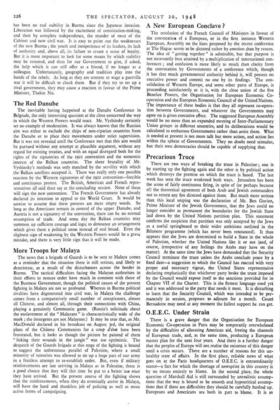Precarious truce
There are two ways of breaking the truce in Palestine ; one is by starting up the fighting again and the other is by political action .which destroys the premise on which the truce is based. The last week has seen the truce weakened both ways. Jerusalem has been the scene of fairly continuous firing, in spite of (or perhaps because of) the theoretical agreement of both Arab and Jewish commanders not to return any fire directed against them. But much more serious than this local sniping was the declaration of Mr. Ben Gurion, Prime Minister of the Jewish Government, that the Jews could no longer consider as permanent the boundaries for the Jewish State laid down by the United Nations partition plan. This statement confirms the suspicion that partition was only accepted by the Jews as a useful springboard to their wider ambitions outlined in the Biltmore programme (which has never been renounced). It thus appears that the Jews are determined to build a State in the whole of Palestine, whether the United Nations like it or not (and, of course, irrespective of any feelings the Arabs may have on the matter). At the same time the Jews have demanded that the Security Council terminate the truce unless the Arabs conclude peace by a fixed date—a suggestion to which the Council has reacted with very proper and necessary vigour, the United States representative declaring emphatically that whichever party broke the truce imposed by the Connell would expose itself to the sanctions provided for in Chapter VII of the Charter. This is the firmest language used yet and it was addressed to the party that needs it most. It is disturbing to learn that the Security Council, which was intended to be per- manently in session, proposes to adjourn for a month. Count Bernadotte may need at any moment the fullest support he can get.


































 Previous page
Previous page